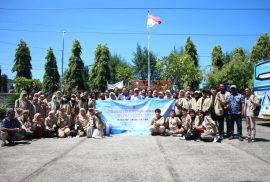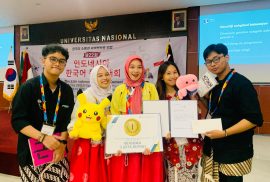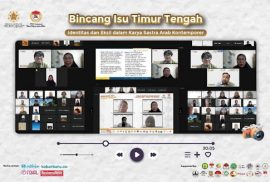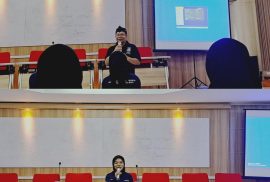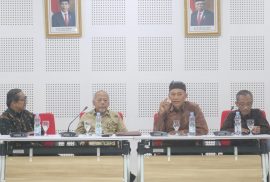On Saturday, May 4th, 2024, the anthropology linguistics class held a field trip to Cilacap in order to get to know the locals, in particular the people who live in the coastal area. Approximately 65 students joined the field trip. They were divided into two classes, which were Class A and Class B. Class A focused on the people and the place around Teluk Penyu Beach such as how people communicate in a particular situation and the toponym around the town. Meanwhile, class B tried to picture the people and its culture. For instance, some groups observed how the locals present their gratitude through sedekah laut and how the people who are fishermen use the equipment, particularly the people in Tegalkamulyan village.
“We were intrigued by the event that they called sedekah laut, a special event only held by people in Cilacap,” said Fandi, a student from class B. He further explained that people in Cilacap deliver their gratitude towards the Almighty by serving some offerings. “ We were dumbfounded that they use more than 100 kinds of things as the offering where each symbolizes a certain idea,” Fandi stated.
Another group from class B tried to describe the equipment used by the local fishermen where they discovered that naming the equipment based on its appearance such as its size and its shape. A similar topic also was discussed by a group from class A. Auna explained that his group tried to illustrate the toponym around the town. On the other hand, Dila and her group took ethnographic communication to observe the interaction between fish traders and the buyers in TPI (Fish Auction Place). “We should’ve visited the TPI but unfortunately we came a little bit too late and the weather wasn’t that good which made them close the TPI. However, we still got the data in particular about the type of communication by interviewing several fishermen,” Lova added.
This field trip was initiated to implement what the students have learned in class and also to get more information from the experts as Dr. Suhandano delivered his remarks to officially open the activity. “The field trip was fun and insightful. We didn’t not only learn about the linguistics aspect but also tried to dig deeper to understand the culture that will enhance the analysis,” Ulfa said.
This field trip was held in cooperation between the Master’s Program in Linguistics and the fishermen organization, Himpunan Nelayan Seluruh Indonesia Kabupaten Cilacap. “We do hope that such an activity like this will always be conducted. It gave us the real picture of being a researcher and also created a strong collaboration with organizations and the people,” said Imam.

